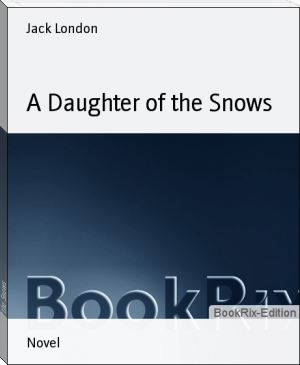Twice Bought by R. M. Ballantyne (latest novels to read .txt) 📗

- Author: R. M. Ballantyne
Book online «Twice Bought by R. M. Ballantyne (latest novels to read .txt) 📗». Author R. M. Ballantyne
Tom had considerable qualms of conscience as to the propriety of the step he meditated, and tried to argue with himself as he went in search of his friend.
“You see,” he soliloquised aloud, “her brother is dying; and then, though I am not a whit more worthy of her than I was, the case is nevertheless altered, for she has no father now. Then by marrying her I shall have a right to protect her—and she stands greatly in need of a protector in this wild country at this time, poor thing! and some one to work for her, seeing that she has no means whatever!”
“Troth, an’ that’s just what she does need, sor!” said Paddy Flinders, stepping out of the bush at the moment. “Excuse me, sor, but I cudn’t help hearin’ ye, for ye was spakin’ out loud. But I agree with ye intirely; an’, if I may make so bowld, I’m glad to find ye in that state o’ mind. Did ye hear the news, sor? They’ve found goold at the hid o’ the valley here.”
“Indeed,” said Tom, with a lack of interest that quite disgusted his volatile friend.
“Yes, indade,” said he. “Why, sor, they’ve found it in big nuggets in some places, an’ Muster Gashford is off wid a party not half an hour past. I’m goin’ mesilf, only I thought I’d see first if ye wouldn’t jine me; but ye don’t seem to care for goold no more nor if it was copper; an that’s quare, too, whin it was the very objec’ that brought ye here.”
“Ah, Flinders, I have gained more than my object in coming. I have found gold—most fine gold, too, that I won’t have to leave behind me when it pleases God to call me home. But never fear, I’ll join you. I owe you and other friends a debt, and I must dig to pay that. Then, if I succeed in the little scheme which you overheard me planning, I shall need some gold to keep the pot boiling!”
“Good luck to ye, sor! so ye will. But plaze don’t mintion the little debt you say you owe me an’ the other boys. Ye don’t owe us nothin’ o’ the sort. But who comes here? Muster Fred it is—the very man I want to see.”
“Yes, and I want to see him too, Paddy, so let me speak first, for a brief space, in private, and you can have him as long as you like afterwards.”
Fred Westly’s opinion on the point which his friend put before him entirely coincided with that of Paul Bevan.
“I’m not surprised to learn that Paul is not her father,” he said. “It was always a puzzle to me how she came to be so lady-like and refined in her feelings, with such a rough, though kindly, father. But I can easily understand it now that I hear who and what her mother was.”
But the principal person concerned in Tom Brixton’s little scheme held an adverse opinion to his friends Paul and Fred and Flinders. Betty would by no means listen to Tom’s proposals until, one day, her brother said that he would like to see her married to Tom Brixton before he died. Then the obdurate Rose of Oregon gave in!
“But how is it to be managed without a clergyman?” asked Fred Westly one evening over the camp fire when supper was being prepared.
“Ay, how indeed?” said Tom, with a perplexed look.
“Oh, bother the clergy!” cried the irreverent Flinders.
“That’s just what I’d do if there was one here,” responded Tom; “I’d bother him till he married us.”
“I say, what did Adam and Eve an’ those sort o’ people do?” asked Tolly Trevor, with the sudden animation resulting from the budding of a new idea; “there was no clergy in their day, I suppose?”
“True for ye, boy,” remarked Flinders, as he lifted a large pot of soup off the fire.
“I know and care not, Tolly, what those sort o’ people did,” said Tom; “and as Betty and I are not Adam and Eve, and the nineteenth century is not the first, we need not inquire.”
“I’ll tell ’ee what,” said Mahoghany Drake, “it’s just comed into my mind that there’s a missionary goes up once a year to an outlyin’ post o’ the fur-traders, an’ this is about the very time. What say ye to make an excursion there to get spliced, it’s only about two hundred miles off? We could soon ride there an’ back, for the country’s all pretty flattish after passin’ the Sawback range.”
“The very thing!” cried Tom; “only—perhaps Betty might object to go, her brother being so ill.”
“Not she,” said Fred; “since the poor man found in her a sister as well as a nurse he seems to have got a new lease of life. I don’t, indeed, think it possible that he can recover, but he may yet live a good while; and the mere fact that she has gone to get married will do him good.”
So it was finally arranged that they should all go, and, before three days had passed, they went, with a strong band of their Indian allies. They found the missionary as had been expected. The knot was tied, and Tom Brixton brought back the Rose of Oregon as a blooming bride to the Sawback range.
From that date onward Tom toiled at the goldfields as if he had been a galley-slave, and scraped together every speck and nugget of gold he could find, and hoarded it up as if he had been a very miser, and, strange to say, Betty did not discourage him.
One day he entered his tent with a large canvas bag in his hand quite full.
“It’s all here at last,” he said, holding it up. “I’ve had it weighed, and I’m going to square up.”
“Go, dear Tom, and God speed you,” said the Rose, giving him a kiss that could not have been purchased by all the gold in Oregon.
Tom went off, and soon returned with the empty bag.
“It was hard work, Betty, to get them to take it, but they agreed when I threatened to heave it all into the lake if they didn’t! Then—I ventured,” said Tom, looking down with something like a blush—“it does seem presumptuous in me, but I couldn’t help it—I preached to them! I told them of my having been twice bought; of the gold that never perishes; and of the debt I owe, which I could never repay, like theirs, with interest, because it is incalculable. And now, dear Betty, we begin the world afresh from to-day.”
“Yes, and with clear consciences,” returned Betty. “I like to re-commence life thus.”
“But with empty pockets,” added Tom, with a peculiar twist of his mouth.
“No, not quite empty,” rejoined the young wife, drawing a very business-looking envelope from her pocket and handing it to her husband. “Read that, Tom.”
Need we say that Tom read it with mingled amusement and amazement; that he laughed at it, and did not believe it; that he became grave, and inquired into it; and that finally, when Paul Bevan detailed the whole affair, he was forced to believe it?
“An estate in the West Indies,” he murmured to himself in a condition of semi-bewilderment, “yielding over fifteen hundred a year!”
“A tidy little fortin,” remarked Paddy Flinders, who overheard him. “I hope, sor, ye won’t forgit yer owld frinds in Oregon when ye go over to take possession.”
“I won’t my boy—you may depend on that.”
And he did not!
But Edwin Buxley did not live to enjoy his share of the fortune. Soon after the wedding he began to sink rapidly, and finally died while gazing earnestly in his sister’s face, with the word “mother” trembling faintly on his lips. He was laid under a lordly tree not far from the Indian village in the Sawback range.
It was six months afterwards that Betty became of age and was entitled to go home and claim her own. She and Tom went first to a small village in Kent, where dwelt an old lady who for some time past had had her heart full to the very brim with gratitude because of a long-lost prodigal son having been brought back to her—saved by the blood of the Lamb. When at last she set her longing eyes on Tom, and heard his well-remembered voice say, “Mother!” the full heart overflowed and rushed down the wrinkled cheeks in floods of inexpressible joy. And the floods were increased, and the joy intensified, when she turned at last to gaze on a little modest, tearful, sympathetic flower, whom Tom introduced to her as the Rose of Oregon!
Thereafter Tom and the Rose paid a visit to London City and called upon Truefoot, Tickle, and Badger.
Truefoot was the only partner in the office at the time, but he ably represented the firm, for he tickled them with information and badgered them with questions to such an extent that they left the place of business in a state of mental confusion, but on the whole, very well satisfied.
The result of all these things was that Tom Brixton settled down near the village where his mother dwelt, and Fred Westly, after staying long enough among the Sawback Mountains to dig out of them a sufficiency, returned home and bought a small farm beside his old chum.
And did Tom forget his old friends in Oregon? No! He became noted for the length and strength of his correspondence. He wrote to Flinders begging him to come home and help him with his property, and Flinders accepted. He wrote to Mahoghany Drake and sent him a splendid rifle, besides good advice and many other things, at different times, too numerous to mention. He wrote to little Tolly Trevor endeavouring to persuade him to come to England and be “made a man of”, but Tolly politely declined, preferring to follow the fortunes of Mahoghany and be made a man of in the backwoods sense of the expression, in company with his fast friend the Leaping Buck. Tolly sent his special love to the Rose of Oregon, and said that she would be glad to hear that the old place in the Sawback range had become a little colony, and that a missionary had settled in it, and Gashford had held by his promise to her—not only giving up drink and gambling entirely, but had set up a temperance coffee-house and a store, both of which were in the full blast of prosperity.
Tolly also said, in quite a poetical burst, that the fragrance of the Rose not only remained in the Colony, but was still felt as a blessed memory and a potent influence for good throughout all the land.
Finally, Tom Brixton settled down to a life of usefulness beside his mother—who lived to a fabulous old age—and was never tired of telling, especially to his young friends, of his wonderful adventures in the Far West and how he had been twice bought—once with gold and once with blood.
The End.




Comments (0)